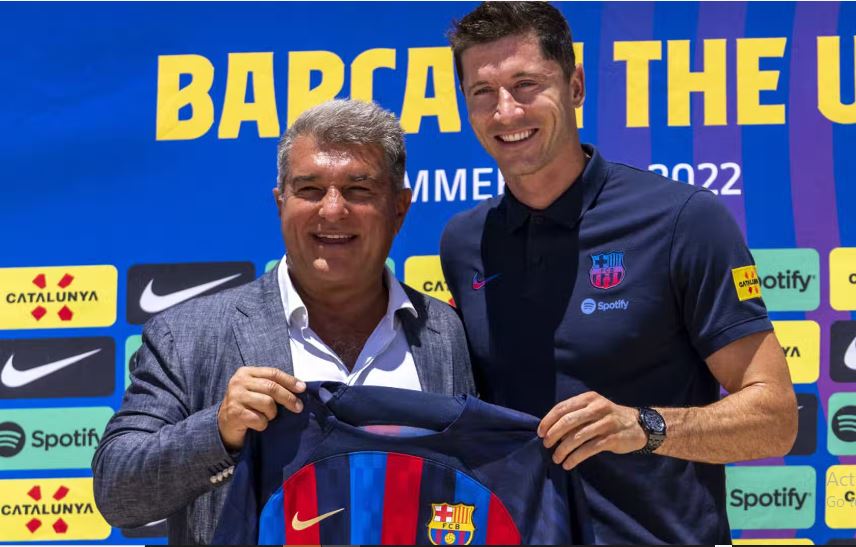Barcelona in 2022 are a truly ridiculous entity. After years of financial mismanagement, a new era has dawned filled with new signings and potential outgoings.
July alone has seen Franck Kessie and Andreas Christensen join on free transfers, Raphinha sign for €60m from Leeds, Ousmane Dembele finally agree to a new contract and Robert Lewandowski arrive after a bitter exit from Bayern Munich. And we haven't even touched on the Frenkie de Jong soap opera yet.
So how are Barcelona financing their deals this summer as they look to return to the top of European football?
Why are Barcelona in debt?
Barcelona posted losses of £404m during the Covid-hit 2020/21 season, with the campaign played out without fans for the majority.
Paying the huge wage bill without any matchday income was part of the reason the club's gross debt rose to £1.2bn - blame has often been attributed to former president Josep Maria Bartomeu, who has maintained his innocence amid accusations of reckless spending. The former president dished out more than €1bn on transfers between 2014 and 2019, with very few turning out to be good deals.
When Joan Laporta was elected, he described the club as "clinically dead" and tough decisions were soon made. There was around €390m owed in player salaries and over €670m owed to banks.
Barça were unable to keep Lionel Messi due to La Liga salary cap regulations and fire sales were made during the 2021 summer, with Emerson Royal, Ilaix Moriba and Junior Firpo all fetching considerable fees.
Work was also done to get players on reduced salaries, with Gerard Pique and Sergio Busquets among those to sign on reduced terms.
Business decisions off the pitch have been taken to give Barça more breathing space. Restructuring allowed the likes of Ferran Torres, Adama Traore and Pierre-Emerick Aubameyang to sign during the January transfer window.
Laporta refinanced the club's debt with Goldman Sachs in a loan of more than €500m, while a shirt sponsorship and stadium naming rights deal worth over €280m was agreed with Spotify.
What are Barcelona's 'levers'?
Barcelona still need to hit budgetary targets, and to do this they are activating 'economic levers'. This means the club are taking action to alleviate the restrictions and pressure brought by the humungous debt. In practice, this means selling assets to bring in revenue.
In June, Barça sold 10% of their La Liga TV rights to global investment firm Sixth Street, generating a capital gain of €267m. They sold a further 15% to Sixth Street in July - these two moves were seen as the first two levers, as they have an impact on the club’s salary limit and new players can then be registered.
It is a risky strategy. The Catalan giants are essentially gambling their future and hoping short-term gains will prop them up. Should they start winning trophies again, that will be another valuable source of income, but they are still accumulating revenues this summer at the cost of losing sources of cash in the future.
A third lever could still be pulled. It would mean selling a 49% share of BLM, their merchandising branch, as well as NFT and metaverse opportunities, though Barcelona are reluctant to take this measure.
These levers are, of course, a one-time measure. Barça must perform on the pitch and show they are back on top form again.
How are Barcelona signing players?
So far this summer, deals for Kessie, Christensen, Raphinha and Lewandowski have been announced. Barça are also closing in on Sevilla defender Jules Kounde and hope to conclude deals for Chelsea duo Cesar Azpilicueta and Marcos Alonso soon.
However, the problem Barça face right now is meeting La Liga's financial fair play criteria. They are not currently in the limits and budget deficits will prevent new players from being able to officially join. The expectation is that players will be moved on for fresh faces, with Frenkie de Jong one such victim of the pressures of the transfer window.
The Dutchman has been heavily linked with Manchester United but remains intent on staying at Barça. Memphis Depay is another being pushed towards the exit door.
Neto, Samuel Umtiti, Oscar Mingueza, Riqui Puig and Martin Braithwaite were among those not to travel for Barça's pre-season tour of the United States and could all be sold this summer.
The first levers will allow Kessie and Christensen to be registered as Barça players, but more salaries will need to be offloaded before Raphinha and Lewandowski are signed up.













No comments:
Post a Comment